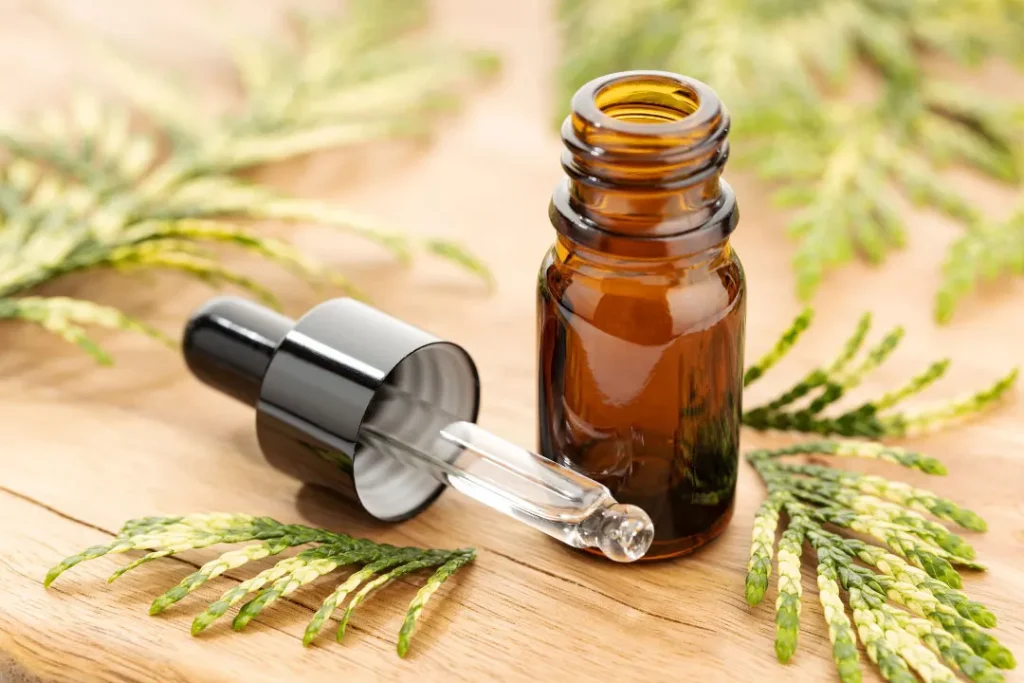Cypress, a member of the Cupressaceae family, has a long history of usage in conventional medical practices. Notably, the bioactive substances present in Cypress have drawn the attention of researchers because to their potential medicinal benefits. This in-depth analysis looks into the properties of Cypress, as well as the recommended dose, side effects, possible drug interactions, and other crucial factors for you to understand how to use it responsibly.
You May Also Like:
The Best Mushroom Supplements for Memory: 5 Top Brands Reviewed
Finding the Best Supplements for Brain Fog After COVID: 5 Top Brands Reviewed
Cypress: Benefits, Dosage, Side Effects, Drug Interactions, and Other Important Information is an original (NootropicsPlanet) article.
Nature of Cypress
There are more than 140 distinct species of Cypress, an evergreen tree. One of these, the Mediterranean Cypress (Cupressus sempervirens), has been well researched for its medicinal uses. Monoterpenes, sesquiterpenes, and diterpenes, which have strong anti-inflammatory, antibacterial, and antioxidant effects, are the primary bioactive components of Cypress. Alpha-pinene, a significant chemical component of Cypress oil, has been discovered to have neuroprotective properties and to have therapeutic promise for neurological illnesses.

Health Benefits of Cypress
Recent scientific studies have supported the traditional applications of Cypress for respiratory disorders, wounds, and skin issues.
- Respiratory Health: According to pre-clinical research, the monoterpenes in Cypress, particularly alpha-pinene, beta-pinene, and cedrol, are a part of what could make it good for respiratory health. Their anti-inflammatory properties can be ascribed to their bronchodilatory activities, making them potentially useful as treatments for illnesses, including bronchitis and asthma.
- Skin Health: In vitro and in vivo research has demonstrated Cypress oil’s powerful antibacterial action against a range of bacterial and fungal pathogens, suggesting that it may be useful for treating and preventing skin infections. Additionally, its anti-inflammatory properties aid in the treatment of dermatitis and the healing of wounds.
- Neuroprotection: The neuroprotective properties of alpha-pinene, a key component of Cypress oil, have been investigated, and some intriguing information is available as a result. This oil may play a role in treating neurodegenerative diseases by inhibiting acetylcholinesterase, a crucial enzyme linked to Alzheimer’s disease, according to in vitro research.

Chemistry of Cypress
Essential oils from Cypress trees are abundant and are distinguished by an abundance of bioactive terpenes and phenolic components. Alpha-pinene, delta-3-carene, and limonene are a few of the most common terpenes. Each of these substances has distinct biochemical characteristics that add to Cypress’ overall medicinal potential.
For instance, the monoterpene alpha-pinene is well known for having anti-inflammatory and antibacterial effects. It can interact with a range of biological receptors thanks to its bicyclic structure, which comprises one double bond. Another monoterpene with anti-inflammatory, antifungal, and bone-healing effects is delta-3-carene.
However, Cypress phenolics including procyanidins, epicatechin, and catechin are potent antioxidants. The oligomers of catechin and epicatechin, procyanidins, for example, have powerful antioxidant, anti-inflammatory, and neuroprotective properties.
Physiological Mechanisms of Action
- Respiratory System: Alpha-pinene and limonene, two monoterpenes, have bronchodilating properties. According to research, they may lessen the symptoms of bronchitis and asthma by reducing the hyperactivity of airway smooth muscles and inhibiting the generation of pro-inflammatory cytokines.
- Skin Health: The antibacterial effects of Cypress oil come from its capacity to damage microbial cell membranes, hence preventing development and multiplication. The lowering of pro-inflammatory cytokines and inhibition of cyclooxygenase (COX) enzymes are responsible for the anti-inflammatory actions, which speed up the healing of wounds and alleviate skin irritations.
- Neuroprotection: Acetylcholinesterase, an enzyme that breaks down the neurotransmitter acetylcholine in synaptic clefts, shows evidence of being inhibited by alpha-pinene. This inhibition may increase the amount of acetylcholine that is available in synaptic gaps, which might lessen the symptoms of cognitive loss brought on by neurodegenerative diseases like Alzheimer’s disease.

Optimal Dosage of Cypress
Although there are no established recommendations for the ideal Cypress dose, the majority of research recommends a concentration range between 1-3% for topical treatments and aromatherapy. This is because essential oils are strong and, if taken undiluted, may have unfavorable effects. Given the paucity of research establishing safe dose ranges, oral use should be done under medical supervision.
Side Effects of Cypress
When used as instructed, Cypress is typically safe. However, those with sensitive skin or those who have allergies to Cypress or related plants may have skin discomfort from topical treatment. Due to a lack of thorough safety study and the possibility for gastrointestinal discomfort, using Cypress oil is typically not advised. Before taking Cypress, pregnant and nursing women are encouraged to speak with medical experts.
Potential Substance Interactions with Cypress
Cypress may have sedative effects, thus care should be used when taking it with sedative drugs, even if there isn’t much study on its interactions with other chemicals. Theoretically, Cypress can intensify these medications’ sedative effects, resulting in extreme sleepiness.

Responsible Use of Cypress
Cypress may be a useful addition to one’s health routine thanks to its abundance of possible Cypress may be a useful addition to one’s health routine thanks to its abundance of possible health advantages. The safe use of any herbal medicine, meanwhile, necessitates knowledge of the substance’s nature, health advantages, and potential hazards. Furthermore, despite the encouraging results, more thorough, carefully monitored human trials are required to confirm Cypress’s therapeutic benefits and create standardized dose recommendations.
Cypress displays remarkable medicinal potential thanks to its wide variety of bioactive chemicals. Nevertheless, due to the possible negative effects and paucity of thorough interaction studies, people should use prudence and consult with their doctors before adding it into their healthcare routines. Future studies will clarify the full potential of Cypress as a beneficial supplement in the field of natural remedies.
Cypress:
Conclusion
Cypress, its oils, and other forms in which it comes in for nutritional supplementation, should consumed with care. It very well may be a deciding factor in the improvement of various health conditions you have or are trying to prevent. Respiration, skin conditions, neurodegeneration, and other issues could be improved with the addition of Cypress added to your dietary plan. This plant has great potential and moderate dangers when consumed, so be sure to personally and professionally have your health status evaluated as you consider taking Cyclamen. Hopefully, this article contributed to your increasing knowledge of Cyclamen and what it might do for you.
References:
- “Phytochemical and Biological Analysis of Skullcap (Scutellaria lateriflora L.): A Medicinal Plant with Anxiolytic Properties.” Retrieved From: https://pubmed.ncbi.nlm.nih.gov/14692724/
- “Cypress – Uses, Side Effects, and More.” Retrieved From: https://www.webmd.com/vitamins/ai/ingredientmono-421/Cypress
- “Health benefits of Cypress.” Retrieved From: https://www.healthbenefitstimes.com/Cypress/
Important Note: The information contained in this article is for general informational purposes only, and should not be construed as health or medical advice, nor is it intended to diagnose, prevent, treat, or cure any disease or health condition. Before embarking on any diet, fitness regimen, or program of nutritional supplementation, it is advisable to consult your healthcare professional in order to determine its safety and probable efficacy in terms of your individual state of health.
Regarding Nutritional Supplements Or Other Non-Prescription Health Products: If any nutritional supplements or other non-prescription health products are mentioned in the foregoing article, any claims or statements made about them have not been evaluated by the U.S. Food and Drug Administration, and such nutritional supplements or other health products are not intended to diagnose, treat, cure, or prevent any disease.


